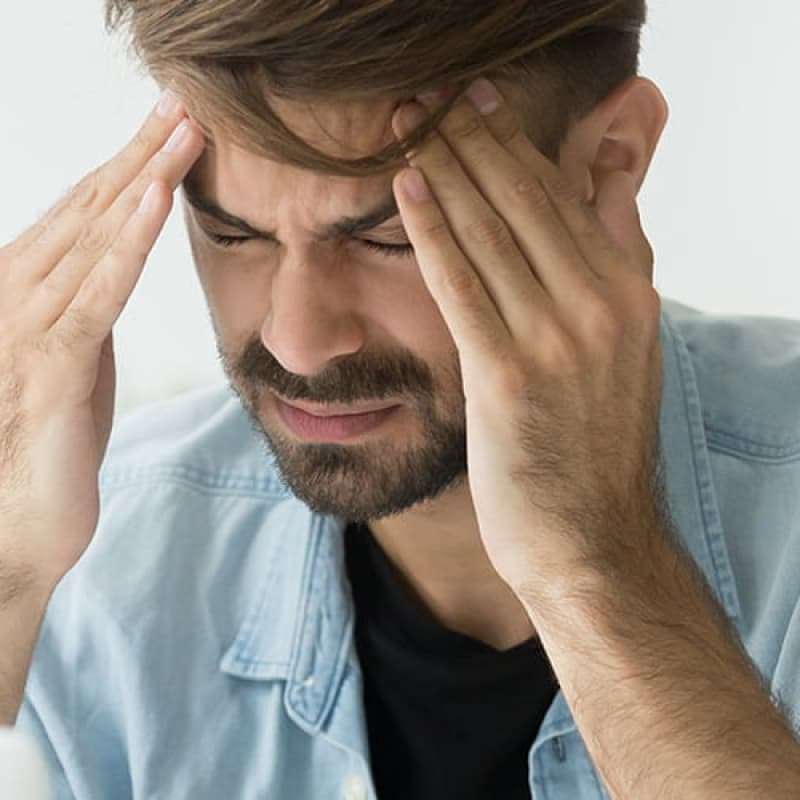
Worried about migraines?
Migraines are more than ‘just a headache’! In some cases, the pain they cause can be disabling. Migraines can induce nausea, disturbed vision, heightened sensitivity to light and sound, and other unpleasant symptoms. There are millions of sufferers worldwide. For some, it’s an occasional disturbance in their life. For others, it’s a constant ordeal. Not all sufferers have migraine medication available to them and turn to home remedies to help with their condition. Let’s examine these common migraine home remedies and see which ones are effective.
What Causes Migraines?
It’s generally accepted that migraines have a genetic basis and are likely caused by changes to nerves and blood vessels within the brain. For some sufferers, there are particular triggers that increase the chance of experiencing a migraine. These may include:
- Stress
- Exhaustion
- Dehydration
Women are more likely to suffer from migraines than men, and 50% of women with migraine find that their period directly affects their condition.
What are the Signs & Symptoms of Migraines?
There are signs that indicate someone is about to experience a migraine. This occur in what is called the ‘premonitory’ or ‘warning’ phase. These may include:
- Mood changes
- Thirst
- Craving sweet foods
The typical symptoms of a migraine attack include:
- Throbbing/pressing headache
- Nausea and vomiting
- Sensitivity to light and sound
Some sufferers experience an ‘aura’ migraine. This is a type of migraine which includes visual disturbances. These can manifest as blind spots, flashes and dots of light and distorted shapes. Other symptoms of aura migraine include muscle weakness, numbness and problems with speech.
Do Migraines Require Treatment?
For frequent sufferers, migraines become a significant day-to-day problem. They disrupt the sufferer’s ability to enjoy life and lead to physical and mental health concerns. Many people with this condition look for medical or home treatment to increase their quality of life.
Are There Home Remedies for Migraines?
Many people who experience migraines look to home remedies to ease the pain of their migraine attacks or try and prevent them entirely. Some people will not always have access to prescribed medication or may use home remedies in combination with prescribed medication. Other people with the condition claim that they find home remedies more effective then prescribed medication. These home remedies include dietary and herbal supplements as well as lifestyle changes.
Are Dietary Home Remedies Effective for Treating Migraines?
Magnesium is a mineral vital for health, and there is research to show that migraine patients should be treated with magnesium. Foods rich in magnesium include green leafy vegetables such as kale and spinach, as well as nuts, seeds and beans.
Riboflavin could treat migraines. It’s found in eggs, lean meats and dairy products. Non-animal product sources of Riboflavin include green vegetables and fortified cereals.
Coenzyme Q10 is needed in the human body for aiding biological processes such as protein production and muscle contraction. Coenzyme Q10 could prevent migraines. Organ meats (e.g. liver), oily fish like salmon and whole grain foods are all good sources.
A healthy diet should contain enough of these vitamins naturally, but supplements can also be taken if you are deficient. You should consult with your GP when taking dietary supplements to treat migraines. Food can be a trigger for migraines, so any dietary changes should take into account any food triggers you may have.

Are Herbal Home Remedies Effective for Treating Migraines?
Butterbur (Petasites hybridus) is a traditional herbal remedy used for a range of health issues, most importantly headaches and migraines. In addition to historical claims, there is data to suggest Butterbur is a preventative treatment. However, Butterbur is not licensed for UK sale and restricted and prohibited in multiple European countries. This is because Butterbur contains Pyrrolizidine Alkaloids which can cause significant liver damage. Due to this, unprocessed Butterbur products should never be consumed. We recommend that you do not take Butterbur products as a home remedy for treating migraines.
Feverfew (Tanacetum parthenium) is another herb used in folk medicine. Although historically used to treat fever, it has gained popularity as a remedy for migraines. One study suggested Feverfew was effective, while others failed to show that it was useful for migraine prevention. It can be taken in capsule form, liquid or chewed as a leaf. Side effects are generally safe, although it isn’t recommended to take Feverfew alongside anti-coagulants (blood thinners). Overall, it isn’t conclusive that Feverfew can help prevent migraines.
Some sufferers inhale lavender oil or apply peppermint oil to their forehead and temples to ease pain and discomfort during a migraine attack. However, these substances are not preventative and are not clinically proven to relieve migraine symptoms.
If you are considering using herbal home remedies to treat migraines, please consult with your GP before doing so.
What Else Can I Do at Home to Treat Migraines?
Poor sleep is linked to headaches and migraine conditions. For many, a lack of sleep increases the likelihood of triggering a migraine. Unfortunately, lying in too long can also trigger a migraine! Working out a regular sleep schedule and sticking to it is likely the best approach to avoid a bad relationship between your sleep and your migraines.
Controlled exercise seems to reduce the frequency of migraine attacks as well as the intensity. It’s important for migraine sufferers to stay active. Some people have found that exercise has triggered a migraine, but this is usually because they haven’t adequately prepared for physical activity. Make sure you have eaten properly and are hydrated beforehand, as well as warming up your body to avoid straining it.
You might be thinking that getting good sleep and exercise is just generic, common sense advice. You’d be right! If you want to tailor a personal approach to reducing migraines, keep a migraine diary. Keep a record of your migraines, making sure to note the symptoms and duration. Try and identify what may have triggered it, looking at how much sleep you got and what food you ate. Over time, you’ll be able to develop a profile that allows you to take personalized preventative measures to migraines and react appropriately when you have them.

Should I Use Home Remedies to Treat Migraines?
There is a lot you can do at home to help cope with migraines. These include sleeping well, moderate exercise and tracking your diet. You should keep a diary of triggers which will help you avoid situations that cause migraines. With nutritional supplements and herbal remedies, you should always consult your GP prior to taking them. Some of the dietary and herbal remedies advocated have promising research, but their preventative ability isn’t scientifically proven. In addition to this, some traditional remedies such as Butterbur can be actively dangerous for your health. Unfortunately, there isn’t a cure for migraines. The best approach is to track your condition and consult a professional.
Is There Effective Medication to Treat Migraines?
If you are looking to treat migraines, there are some clinically proven medications available. Triptan medicines are specifically prescribed to migraine sufferers. Triptans constrict the blood vessels in the brain, which is believed to counter the migraine process. Triptans can be taken in a variety of ways such as tablets, nasal sprays and injections. It’s possible to experience side effects from taking Triptan medications.
These may include flushing and tingling sensations, feelings of heaviness in the face and parts of the body, and in some cases nausea and a dry mouth. In general, the side effects are mild and can subside on their own. You should be careful not to overuse Triptan medications, particularly in conjunction with other painkiller medications. A commonly prescribed medication is Sumatriptan 50mg. Talk to a medical professional about your migraines and whether you should be prescribed Triptans.
There are a variety of Triptan tablets available, including Sumatriptan, Zolmitriptan, Rizatriptan and Sumatriptan.
If you have any questions, sign up for our free Ask A Pharmacist service for answers to any health or prescription related concerns!
Further Reading
- Migraine | NHS
- Sumatriptan | National Institute For Health And Care Excellence
- Sumatriptan For Migraine And Cluster Headaches | PatientInfo
- Zolmitriptan | WebMD
- 10 Best Migraine Apps of 2020 | healthline









